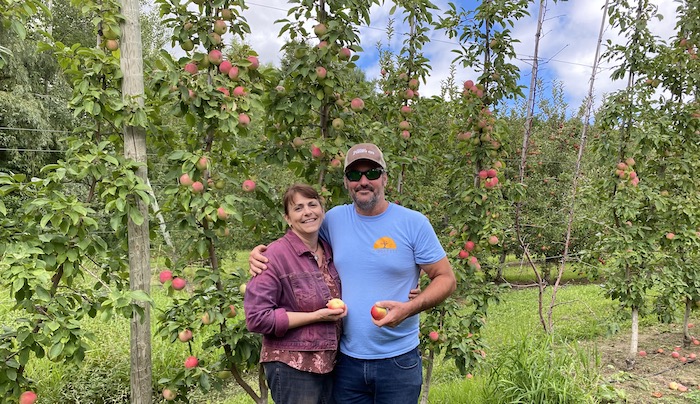
Leelanau’s New “It” Apple, Growing For Hard Cider & More From The 2020 Harvest
By Emily Tyra | Sept. 7, 2020
Despite hardships with COVID-19 and labor shortages, there is good news for Leelanau’s apple growers: According to Nikki Rothwell, Michigan State University Extension Specialist and coordinator of the Northwest Michigan Horticultural Research Center, “Fruit quality is beautiful. I think that consumers are going to be happy about our apples this year.”
The majority of apples grown in Leelanau County are shipped to “The Ridge,” a fruit-growing region north of Grand Rapids known for apple production, where fresh apples are packed and shipped to stores.
Some of Leelanau’s smaller-scale farms — like VerSnyder Orchards in Lake Leelanau — also sell at roadside stands, and early varieties like Premier Honeycrisp and Zestar apples are popping up at Leelanau farmers markets now.
As for this year’s “it” apple, Rothwell says, “everyone still loves a Honeycrisp, however, some growers, including Kevin VerSnyder, are growing an apple out of the Midwest Apple Improvement Association breeding program called an Evercrisp. The hard thing is ripening that apple so far north, but it is a great eating apple. Growers did a good job with thinning this year, so size is going to be excellent. Plus, these cooler nights are going to put a beautiful red color on the fruit as it is ripening.”
Evercrisp is a Honeycrisp and Fuji cross that stays crunchy for months in storage and is gaining traction with consumers — with a little glitch this past season. “COVID came in, and it shut the sales down,” explains VerSnyder. “My Evercrisp were going to go to Meijer, and once COVID hit, Meijer took all the higher-end apples off the shelf and went back to the basics: Gala, Fuji, and Honeycrisp.”
Instead of going to fresh sales, VerSnyder’s Evercrisp apples went to processing, “at 21 cents a pound instead of 70-some cents per pound.” Still, he says, he’s looking forward to bouncing back with this year’s crop — with Evercrisp harvest anticipated the first week of November.
VerSnyder’s farm is considered small-scale, with 8 acres of apples he grows on the original farmstead his great-grandfather started in the 1870s. A few of the trees on the property date to then; the heirloom McIntosh apple he sells at the farmstand is one of the most heralded.
By contrast, Cherry Bay Orchards is among the largest apple growers in the county, with 3,000 acres in apples, of which president Mark Miezio says “one-third are grown high density.”
High-density orchards have closely spaced trees — 150 to 180 per acre — grown on a support system, or trellis.
Miezio explains the benefit: “People have a beautiful picture of this traditional, freestanding apple tree, but the struggle exists where only the apples on the outside of the tree get a lot of sun and a lot of color. The inside is tougher to care for. The high-density orchard produces a wall of fruit just two feet wide, allowing for more uniform sunlight, more uniform application of crop-protecting materials, and streamlined pruning.”
Rothwell says growers transitioning their apple orchards to high-density production systems are finding it to be the most economical way to grow. “The new orchard systems have higher quality fruit, and the fresh market fruit makes more money than processing fruit [for applesauce, etc.].”
VerSnyder started planting high-density in 2016; it now represents half of his acreage. “Planting apples at high-density costs $15k to $20k per acre, so I had a lot of risk there at the start, but I am already seeing the benefits.”
Hard cider apples that can be produced in modern high-density growing systems are also a new niche for some Leelanau growers, including VerSnyder. He collaborated with researcher Chris Gottschalk from Michigan State University’s Department of Horticulture in growing red-fleshed apple cultivars to introduce red juice to the hard cider industry, as well as with overall cider apple evaluation in Michigan.
“Chris did 600-tree plots at several farms from the UP all the way to southern Michigan — 10 trees of 60 varieties each — to see what does well, so a lot of us aren’t wasting money and time planting stuff that isn’t going to work. The cider varieties are particularly susceptible to winter injury, but there are a few that are doing really well, which is exciting.”
But even with beautiful quality fruit for 2020, this season is not without challenges. “COVID has changed things on the farm,” says Rothwell. On August 3, the Michigan Department of Health and Human Services (MDHHS) issued a public health order requiring any agricultural employer of migrant or seasonal workers with over 20 employees on-site at a time to provide one-time COVID-19 baseline testing of all workers and testing of all new workers prior to any in-person work.
Says Rothwell, “Growers have been frustrated because it seems our agricultural workers have been targeted [for testing] a bit more than other types of workers. Growers are trying to keep workers separated...it has been a challenge for sure.”
Miezio adds, “Labor continues to be a challenge, especially during COVID. This is our seventh apple season we have been bringing in H-2A Temporary Agricultural Workers. Due to COVID, any hiccups in the visa application process and ultimately getting the visa means an administrative hold with a 6-to-8-week timeline — the season is over before it is resolved.”
He explains that at Cherry Bay Orchards, 26 of the 33 expected H-2A employees arrived, “so we are reviewing harvest strategies right now to adjust to fewer workers. The cool weather this week will help: it is slowing down the apple maturity enough to buy some time to implement new strategies.”
Lisa Peacock, health officer for the Benzie Leelanau District Health Department, explains that her agency is in dialogue with Migrant Resource Council representatives as well as Northwest Michigan Health Services, Inc. — who are doing the bulk of the testing — to support the process.
“We understand that this is a vulnerable population who may have significant barriers to accessing care and testing as well as may be living or working in close contact with others,” she says. “The intention behind the order is to ensure their safety and reduce the risk of transmission and we are ready to support housing providers and employers in keeping their workers healthy and safe.”
Peacock adds that while the employers are responsible for the cost of testing, “the migrant population is often eligible for Emergency Services Only Medicaid which covers testing and our Community Health Workers as well as other community partners are available to assist them with the application.”
VerSnyder, whose harvest crew is not large enough to require the testing, is also feeling the pinch of the labor shortage. That now has his entrepreneurial wheels turning: “I am considering doing U-Pick apples — the labor is built in, and both visitors and locals seem to love the experience of picking their own fruit.”
Photo: Kevin VerSnyder, pictured above with wife and business partner Kat VerSnyder on their farm in Lake Leelanau.
CommentNational Study: Leelanau County Tops the Nation in Food Costs
Leelanau County is the most expensive county in the country for food costs, according to a recent ...
Read More >>Tuesday Filing Deadline Brings County Election Races Into Focus
Though early signs indicated a concerningly sparse field for this year’s impending Leelanau County Board of Commissioners ...
Read More >>The Latest Leelanau County Blotter & 911 Call Report
The Leelanau Ticker is back with a look at the most alarming, offbeat, or otherwise newsworthy calls ...
Read More >>Barge Owner Pleads Guilty, Gets One Year To Move Vessel
Donald Balcom, the owner of a decrepit barge that has been repeatedly abandoned at numerous points around ...
Read More >>



